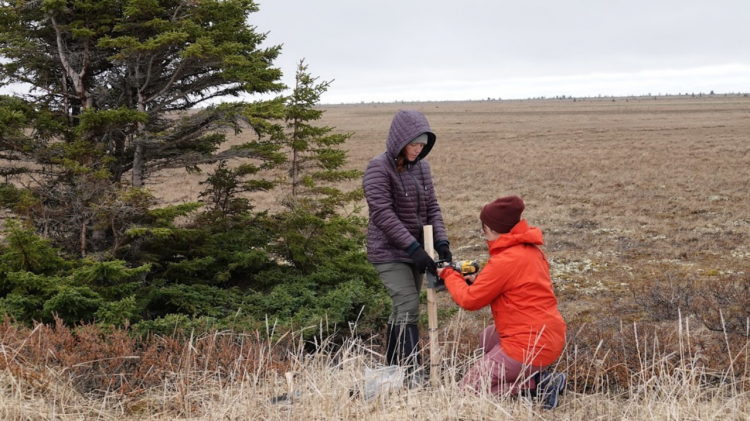
Working with the NDMNRF in northern Ontario this summer added substance and flavour' to students' post-graduate research
Whether flying along the Hudson Bay coast by helicopter, setting up wildlife cameras next to fox dens or watching in amazement as a herd of more than 1,000 caribou wandered through their field camp, Trent University students Laura Corrigan and Gillian Muir had an extraordinary experience this summer conducting research in Polar Bear Provincial Park.
Polar Bear Provincial Park - Ontario's largest and most northern park - is a haven for polar bears, moose and hundreds of bird species, with coastal areas frequented by seals, walruses and beluga whales. In this remote location, accessible only by air, the two students gained invaluable hands-on experience through the University's unique collaboration with the Ministry of Northern Development, Mines, Natural Resources and Forestry (NDMNRF). By living and working alongside the NDMNRF researchers, the students also gained professional connections and were able to use invaluable Ministry data.
"The NDMNRF researchers added so much substance and flavour to our research experience up north and have given us more insight into conservation outside of academia," says Gillian, who is pursuing her Masters in Trent's Environmental & Life Sciences (ENLS) graduate program.
Gaining valuable skills in the field
"Students gain experience in the communication of science to policymakers and the transfer of environmental science to policy and practice," says adjunct Trent professor, Dr. Glen Brown, an NDMNRF research scientist who runs the Northern Animal Ecology Lab. "Many students are able to go on to work for the government following graduation."
The students' research focused on how climate change, even warming by just a few degrees, affects permafrost, thereby altering northern ecosystems through changes in breeding habitat, vegetation and predator-prey relationships. Their research monitors the impact of environmental conditions such as vegetation, snow and soil moisture, all of which have warming and cooling effects, on the ground above permafrost known as the active layer.
In their downtime, Laura and Gillian also enjoyed memorable experiences with NDMNRF researchers, such as monitoring shorebirds, discovering a short-eared owl nest and learning how to spot a distant caribou, which often blends into the landscape.
Laura, who is pursuing her Ph.D. in the ENLS program, says she is thankful that the transformative experiential learning opportunity gave her more "tools in her tool belt".
"This experience has also confirmed that working in government research is a path I might one day take," she adds.
The Research Support Fund supports a portion of the costs associated with managing the research funded by the Canadian Institutes of Health Research, Natural Sciences and Engineering Research Council, and Social Sciences and Humanities Research Council, such as salaries for staff who provide administration support, training costs for workplace health and safety, maintenance of libraries and laboratories, and administrative costs associated with obtaining patents for inventions.
Trent University students Laura Corrigan and Gillian Muir had an extraordinary experience this summer conducting research in Polar Bear Provincial Park










